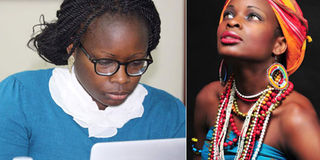TAKE 5 with Felogene Anumo

Felogene Anumo is a Pan Africanist and young feminist activist who is passionate about social justice. PHOTOS | FILE
What you need to know:
- However, the main reasons people may not like to associate themselves with feminism comes down to the way feminism is defined, the idea that equality is already achieved, as well as society’s emphasis on individual gains at the expense of collective action.
- I strongly believe that intergenerational leadership is essential to the life of movements as it leads to the creation of a pipeline of leaders, diversifies voices and perspectives and deepens inclusivity.
Born and raised in Kenya, Felogene Anumo is a Pan Africanist and young feminist activist who is passionate about social justice.
She has over eight years of experience in advancing gender equality through grassroots and online activism. Anumo is currently working with the Association for Women Rights in Development (AWID) as the Manager for the Young Feminist Activism Program.
1. What, in your definition, is a feminist?
A feminist is someone who believes in equality and freedom of choice for all. Feminism as a politics, suggests that the systematic exclusion and marginalisation of women in society is not natural. It is based on patriarchal gender power relations that systematically privileges the collective interests of men and boys over those of women and girls in all spheres of life.
Having said that, it is important to note that feminism is about more than ending sexism as it is equally about ending all the interconnected systems of oppression that affect different women in different ways, such as racism, capitalism, able-ism, heterosexism and all other -isms.
2. Why do you think people are so against the label, or labelling themselves as such?
There are a range of reasons. They may believe that only ‘active’ feminists have the right to adopt the label, may have encountered individual feminists whom they dislike, feel it is a Western discourse and others are just simply averse to labelling themselves.
However, the main reasons people may not like to associate themselves with feminism comes down to the way feminism is defined, the idea that equality is already achieved, as well as society’s emphasis on individual gains at the expense of collective action.
3.When you look back at your experiences and career, what was your proudest moment?
When I worked with a group of young girls to develop a “Feminist Leadership Curriculum for Adolescent Girls’. I strongly believe that intergenerational leadership is essential to the life of movements as it leads to the creation of a pipeline of leaders, diversifies voices and perspectives and deepens inclusivity.
4.What can an individual do, by themselves, to further the cause of social justice?
There can be no social justice without gender justice. Integrating gender equality has to be part of our daily practice. We have to be able to think about it in our own terms, integrate it into our ways of thinking and being and negotiate a place for it in our own lives.
5.When you’re not out there trying to save the world (from patriarchy), what do you do for fun?
I certainly look forward to slowing down from the all the excitement of fighting oppression (smiles).
I regularly attend and enjoy Bikram Yoga and Zumba classes. I look forward to time spent with my inner circle of friends and family. We attend concerts, dance classes, quiz nights…I also really enjoy spending time with my daughter, Zhane Lindiwe. Actually, she occupies most of my fun time as she is quite a bundle of energy and joy.





